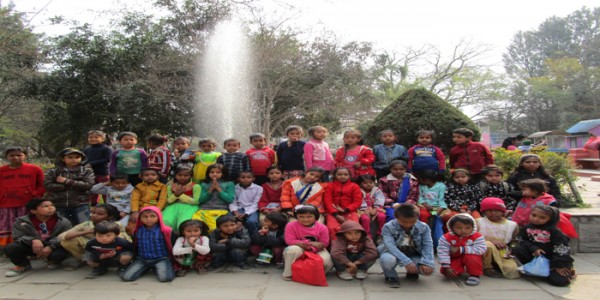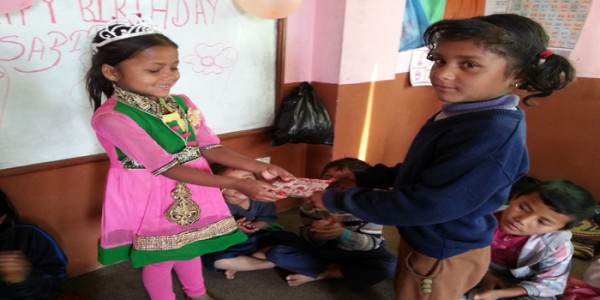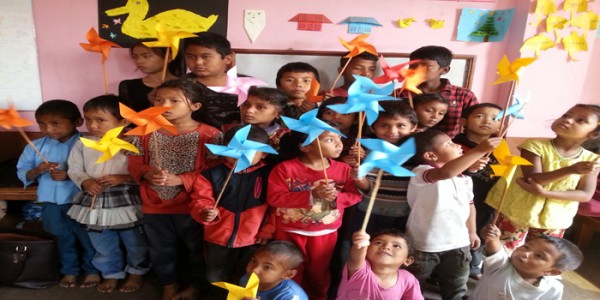Education for Children
Education is a fundamental human right: Every child in every country is entitled to it. Education helps to develop a successful and productive future and influences generations to come. Basic education helps children with the knowledge and skills they need to adopt healthy lifestyles and to take an active role in social, economic and political decision-making in their transition to adulthood. In Kathmandu there are a lot of children who do not go to school. Therefore SOUP supports formal and non-formal educational activities.
Formal Education
SOUP is providing scholarship to children of Urban Poor Communities since 1996. SOUP helps children from poor families in Kathmandu, Lalitpur and Kirtipurby providing Scholarships to support their human rights for education. In Nepal, children get Scholarship free of access but an extra amount has to be paid for school materials, the uniform and extra activities. This amount must be paid once a year and the average cost is 5.000 NPR ($51). This is why there are still a lot of children from poor families who don’t get basic education. Therefore SOUP provides Scholarship from class 1 to 10.
The children are being selected with the collaboration of community clubs and other groups of respected areas because local people knowmore about the children. To monitor the children SOUP organize meetings with the school teachers and principals to discuss students’ performance and also to improve their educational capabilities.
At present 117 students are getting scholarships with the support of SOUP. Many students have submitted the application for scholarship and SOUP is selecting morestudents from poor communities.
Non-Formal Education
SOUP provides non-formal education (NFE) for school going aged children since 2006. The non-formal education is for those children who have never had a formal education and children who have dropped out of a formal education. Most of the children are from poor migrant families. In these families mothers go to work early in the morning to late evenings. Their income is very low and can cover the room rent and feeding the family. There is no money to enroll the children in basis education. Therefore SOUP developed the NFE class: a school preparation class for one year to teach the children the basics they need to enroll in the formal education. After completing one year they are transferred to the government school according to their intellectual capacity. If the family can still not afford to enroll the children to school SOUP will give financial support. Altogether 117 children were transferred to a government school.
There are three child centers established by SOUP: Kalilmati, Bansighat and Jadibudi. NFE are running daily for five hours from 10:00 am to 3:00 pm except on Saturdays and public holidays. NFE class gives knowledge about English, Math, Nepali, Science and Social studies. The children are assembled by door to door visits and when families bring their children themselves to the centers. Altogether 355 school aged children get opportunities for education since 2006 by SOUP’s NFE classes.
After School Program (ASP)
After School Program (ASP) is a school supportive class for the school going children who are studying in the public schools to enhance their education level as well as behavior change compared to the private schools’ students. The overall goal of ASP is to improve academic performance and prevent school dropout ratio. Most of the parents of public school students are not properly educated so this program helps the students in developing their studies and good career. This class helps students who are poor in their studies as well as they are engaged in extra activities too. So, this program supports for aware on child rights and child issues. This program will be a platform of poor children’s quality education to uplifting their creativity and hidden capacity.
SOUP has started After School Program (ASP) as a pilot project since September 2014 in Kathmandu Metropolitan City Ward No. 32, Jadibuti. After School Program is successful in increasing the school enrolment rate as well as have shown positive results in the communities by doing behavior change in the students than before. It helps to make the students capable and compete to private school students too.
The promotion of ASP class program in every community must go side by as it is demand by other working areas of SOUP. In that way, SOUP launched six ASP classes in different places of Kathmandu and Lalitpur.
ASP focused on 30 children ages 6 to 12 of grade one to grade four by two teachers in Public School nearby their living area. Classes are running for 2 hours daily after their regular school class, 6 days a week at their own school. This essential program helps in completing home work given by the school teacher and developing the career by extracurricular activities to those students who are from poor family background.




